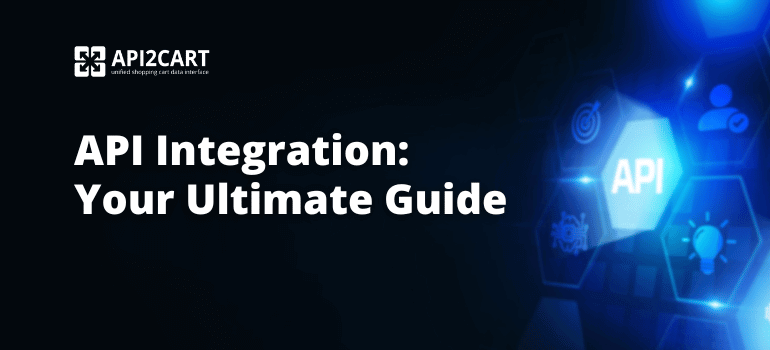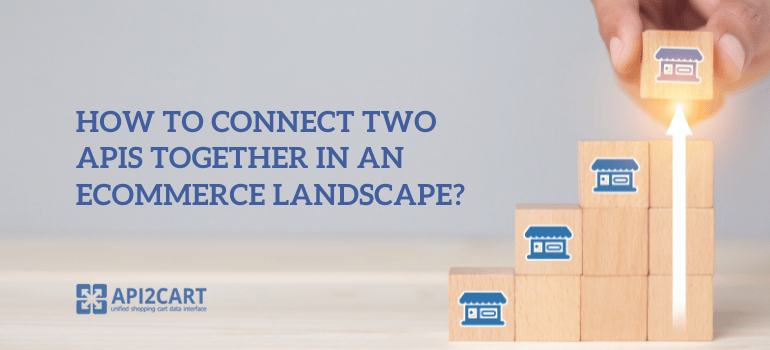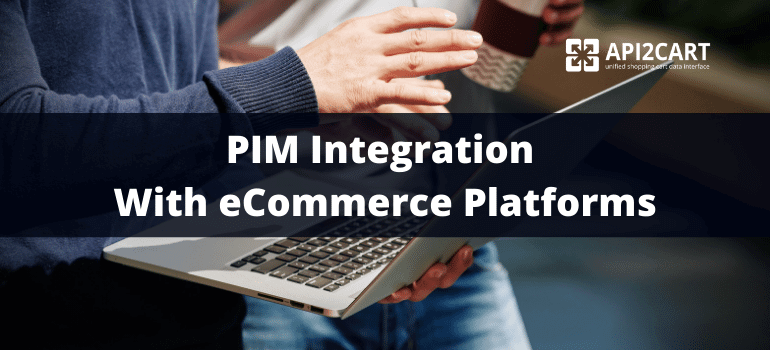
PIM software vendors must constantly innovate and expand the number of their eCommerce integrations to succeed in the market. Of course, if you are running a PIM service, you have to fight against numerous direct competitors to come out on top. No matter what country you are in, there will always be a few top PIM fighting for market supremacy.
As a PIM provider, your goal should be to offer excellent product management functionality for your customers. You should also provide a central hub that allows your customers to manage their assets and product information across all of their sales channels.
The best way to provide great service to a larger number of customers selling online is to integrate your PIM with multiple eCommerce platforms.
PIM eCommerce integration allows you to propose your service to online store owners and provide its functionality to them. Moreover, having such kind of connection with multiple eCommerce platforms enables you to access the data from their databases and use it accordingly.
In this article, we will explore in detail the process of developing a reliable integration between PIM solutions and different platforms like Magento, Shopify, WooCommerce, etc. Also, we will show the most straightforward way how to perform it.
Main Benefits of PIM Integration With eCommerce Platforms
To deliver a superior experience, you need to create high-end PIM software that can perform all the functions your customers need. The better and more responsive your PIM solution is, the easier it will be for eCommerce store owners to manage their product data. It will ultimately lead them to more sales and better overall satisfaction of the e-shop's customers.
A major focus of your PIM software business should be eCommerce integration development. In order to perform all the functions required for e-retailers, your PIM solution needs to integrate with various shopping platforms like Magento, Shopify, etc. This allows your system to access product data from all e-shops built on these platforms.
So, to better serve e-sellers and provide them with a centralized location to manage and capture product information, it is imperative to integrate your software with the most commonly used eCommerce platforms.
The quality of your PIM software depends entirely on the quality of your integrations. Integration with eCommerce platforms refers to the process of tying your system to the APIs of platforms like Shopify, Amazon, ZenCart, WooCommerce, etc. A good integration provides you with a variety of benefits, of which we would like to highlight the following:
- Access to valuable data that you can use to better serve your customers
- The ability to grow your customer base by reaching a wide range of new customers who use different shopping platforms for their business needs
- Suggesting new functionalities for your existing and new customers
- Expanding your market share and brand awareness
How eCommerce Integration Helps PIM Solutions to Perform Their Functions?
Now you are well aware of the benefits of integrating your business with multiple eCommerce platforms. So, it’s time to look at how integration allows your software to provide its functions.
As a vendor of PIM, you need to be able to access information about orders and products and work with prices, product names, inventory levels, and e-stores' customer data. By integrating your software with shopping platforms, you can pull all of this type of information from their databases.
For example, a PIM system integration with the Shopify platform, allows you to offer all of your functionality to eCommerce store owners using Shopify. In other words, you can enable them to:
- Easily categorize and manage products in e-stores
- Synchronize product data to maximize productivity
- Centralize all products in an e-store in one place
- Improve consistency of product data across e-retailers' sales channels
- Edit attributes and values for multiple products at once
- Use advanced filtering options
However, the process of PIM eCommerce integration development cannot be so easy. Each of the platforms has its logic and architecture. Moreover, not all of them have detailed API Docs that help perform the connection smoothly. Therefore, it can be a technically complex task requiring a lot of your company's money and your developers' time. You can develop your PIM system integration in-house or use a third-party integration service like, for example, API2Cart.
API2Cart can help PIM solutions seamlessly connect to multiple eCommerce platforms at once. Using this service gives you unlimited access to all the data from your customers' e-stores. Furthermore, once you are connected to 40+ platforms through API2Cart's unified API, you don't have to worry about integration upgrades because the API2Cart team takes care of it.
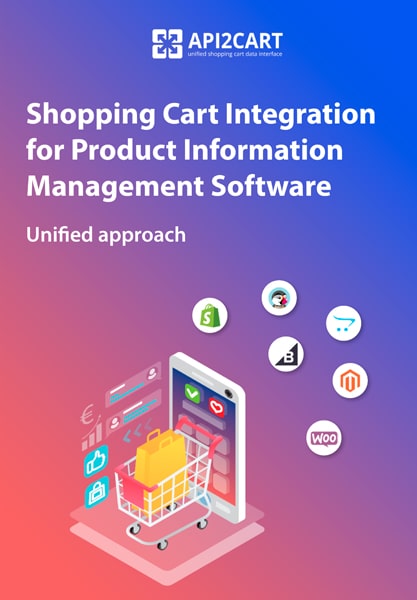
Shopping Platform Integration for PIM Software
Explore how to develop the integration between your PIM and multiple shopping cart solutions easily.
How Your PIM Software Can Sync Product Data Easily
With API2Cart's supported API methods for retrieving and managing e-store data, you can be sure that you can easily synchronize product info, create product catalogs, and generate product-related reports and analytics. So how does API2Cart work?
To start testing API2Cart, you need to create your free trial account on our service. After that, you can add your clients' stores based on any of the supported shopping platforms to the system and start working with their data. For that, you can use the wide range of API2Cart API methods. After the period of 30-days, you need to have a developed integration between your PIM software and API2Cart. Then, it allows you to use all API2Cart functionality further.
Now, let's look at the example of how you can use API2Cart to synchronize product data across multiple sales channels. To do this, you need to use the API method product.list, which is provided by API2Cart. It allows you to get a list of e-store products along with all related information such as prices, descriptions, brand info, and images.
The example of the product.list method response:
{
"return_code":0,
"return_message":"",
"result":{
"products_count":5,
"product":[
{
"id":"69",
"name":"egestas",
"price":229.13
},
{
"id":"66",
"name":"arcu et",
"price":982.5
},
{
"id":"67",
"name":"egestas",
"price":1147.2
},
{
"id":"68",
"name":"tincidunt",
"price":182.3
},
{
"id":"58",
"name":"aliquet nec",
"price":403.42
}
]
}
}
To add products to the store and update them, you need to use the product.add and product.update API methods.
The product.add method allows your system to push products to stores on Amazon, eBay, or any other shopping platform supported by API2Cart.
The product.update method allows you to easily edit product details such as prices, descriptions, images, or other information in the stores.
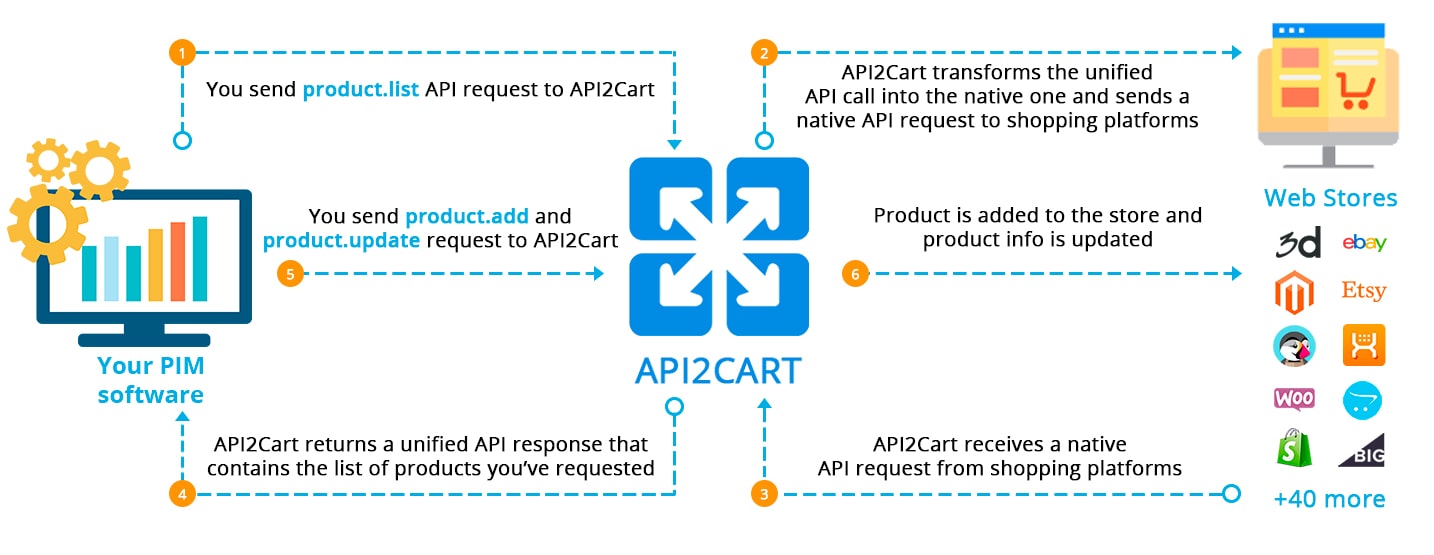
So, all of these API methods enable your PIM solution to easily get, add and update product information on multiple eCommerce platforms.
Conclusion
At API2Cart, we’re talking about your tech language. We provide our unified API to make the development of various eCommerce integration more accessible and fast. You can use our service to develop your PIM integration with over 40 eCommerce platforms. Their list includes Magento, Shopify, WooCommerce, Amazon, eBay, OpenCart, Ecwid, BigCommerce, Etsy, Walmart, Hybris, etc. In addition, we provide detailed API Docs, SDK, flexible pricing plans, and 24/7 support service. With the help of our API methods, you will be able to manage the product data from multiple stores based on different shopping platforms with no difficulties.
Contact us now by phone, chat or email to learn more. Or you can try API2Cart for free for a whole month right now by registering your account.
